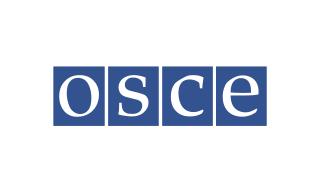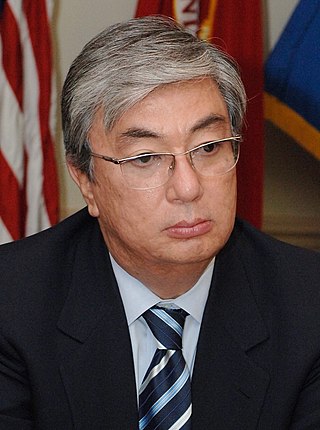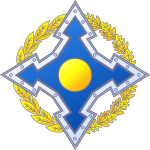
The Armed Forces of Armenia, sometimes referred to as the Armenian Army, is the national military of Armenia. It consists of personnel branches under the General Staff of the Armenian Armed Forces, which can be divided into two general branches: the Ground Forces, and the Air Force. Although it was partially formed out of the former Soviet Army forces stationed in the Armenian SSR, the military of Armenia can be traced back to the founding of the First Republic of Armenia in 1918. Being a landlocked country, Armenia has no navy.

The Organization for Security and Co-operation in Europe (OSCE) is a regional security-oriented intergovernmental organization comprising member states in Europe, North America, and Asia. Its mandate includes issues such as arms control, the promotion of human rights, freedom of the press, and free and fair elections. It employs around 3,460 people, mostly in its field operations but also in its secretariat in Vienna, Austria, and its institutions. It has observer status at the United Nations.

The Shanghai Cooperation Organisation (SCO) is a Eurasian political, economic, international security and defence organization established by China and Russia in 2001. It is the world's largest regional organization in terms of geographic scope and population, covering approximately 80% of the area of Eurasia and 40% of the world population. As of 2021, its combined GDP was around 20% of global GDP.

Imangali Nurgaliuly Tasmagambetov is a Kazakh politician and diplomat, who is the current Secretary-General of the Collective Security Treaty Organization since January 2023. He was the Kazakh Ambassador to Russia from 2017 to 2019. He was Deputy Prime Minister of Kazakhstan from 2016 to 2017 and Minister of Defense of Kazakhstan from 2014 to 2016. He was the akim of Astana from 2008 to 2014 and from 2004 to 2008, as akim of Almaty. Before that, from 2002 to 2003, he was the Prime Minister of Kazakhstan.

The Collective Security Treaty Organization (CSTO) is an intergovernmental military alliance in Eurasia consisting of six post-Soviet states: Armenia, Belarus, Kazakhstan, Kyrgyzstan, Russia, and Tajikistan, formed in 2002. The Collective Security Treaty has its origins in the Soviet Armed Forces, which was replaced in 1992 by the United Armed Forces of the Commonwealth of Independent States, and was then itself replaced by the successor armed forces of the respective independent states.

The Department of Peace Operations (DPO) is a department of the United Nations charged with the planning, preparation, management and direction of UN peacekeeping operations. Previously known as the Department of Peacekeeping Operations (DPKO), it was created in March 1992, as part of a restructuring of the UN's peace and security apparatus. The DPO retains the core functions and responsibilities of its predecessor, with a greater emphasis on cohesion, integrating different resources and knowledge, and promoting human rights.

Bilateral relations between modern-day Armenia and the Russian Federation were established on 3 April 1992, though Russia has been an important actor in Armenia since the early 19th century. The two countries' historic relationship has its roots in the Russo-Persian War of 1826 to 1828 between the Russian Empire and Qajar Persia after which Eastern Armenia was ceded to Russia. Moreover, Russia was viewed as a protector of the Christian subjects in the Ottoman Empire, including the Armenians.

The Collective Rapid Reaction Force is a joint combined arms task force comprising independent military units from the Collective Security Treaty Organization member states. CRRF was created in 2009 with the general purpose to counter a limited military aggression against CSTO member states, to fight against terrorism and drug trafficking.

Kenes Rakishev or Kenges, is a Kazakh businessperson who is close to the authoritarian regime in Kazakhstan. He is the son-in-law of former Kazakh Prime Minister, Imangali Tasmagambetov.

Sherali Khayrulloyevich Khayrulloyev is a retired Tajikistani general and politician. He was the Minister of Defense of Tajikistan from 1995 to 2013.
The Zhas Ulan Republican School named after Baurzhan Momyshuly also known as the Almaty Zhas Ulan Republican School is a military boarding school in Kazakhstan's Armed Forces which specializes in the training of Kazakh youth who want to join the military.

Lieutenant General Stanislav Vasilievich Zas is a Belarusian general and politician who is a former Secretary-General of the Collective Security Treaty Organization and was formerly the State Secretary of the Security Council of Belarus.

The TURKPA in full, the Parliamentary Assembly of Turkic States, is an international organization comprising some of the Turkic countries. It was founded on 21 November 2008 in Istanbul. The General Secretariat is in Baku, Azerbaijan. The member countries are Azerbaijan, Kazakhstan, Kyrgyzstan and Turkey. Hungary and Northern Cyprus are observers.

The Tasmagambetov Government was the 5th government of Kazakhstan. Led by Prime Minister Imangali Tasmagambetov, it was formed on 28 January 2002 after his predecessor Kassym-Jomart Tokayev stepped down from his post along with his entire cabinet. President Nursultan Nazarbayev nominated Tasmagmabetov for office to which it was unanimously approved by the Parliament. Prior to that, Tasmagambetov served as the Deputy PM under Tokayev's cabinet. It was believed that the cause of the change in the government was an attempt to strengthen its stability as it faced opposition from political groups.

The Tokayev Cabinet was the 4th government of Kazakhstan under the leadership of Kassym-Jomart Tokayev. It was formed shortly after Prime Minister Nurlan Balgimbayev resigned from his post on 1 October 1999 shortly before the legislative election to become the president of Kazakhoil. President Nursultan Nazarbayev named Kassym-Jomart Tokayev as the Acting Prime Minister, who, prior to that, served as the Deputy Prime Minister as well as the Minister of Foreign Affairs under Balgimbayev's cabinet. On 12 October, the Parliament approved Tokayev's nomination to the post of the PM.
Lieutenant General Ramil Khalilovich Nadyrov is a Tajik military leader who was the Chief of the General Staff of the Armed Forces of the Republic of Tajikistan from 2002 to 2014. He was also the first Chief of the Joint Staff of the Collective Security Treaty Organization (CSTO) from April 2003 to June 2004.

Aselle Tasmagambetova is the daughter of former Kazakh Prime Minister Imangali Tasmagambetov. She is married to Kenes Rakishev, a Kazakh businessperson who is close to the authoritarian regime in Kazakhstan.

The 2022 Kazakh unrest, also known as January Events, Bloody January, or the January Tragedy, was a series of mass protests and civil unrest that began in Kazakhstan on 2 January 2022 after a sudden sharp increase in liquefied petroleum gas prices following the lifting of a government-enforced price cap on 1 January. The protests began peacefully in the oil-producing city of Zhanaozen and quickly spread to other cities in the country, especially the nation's largest city, Almaty, which saw its demonstrations turn into violent riots, fueled by rising dissatisfaction with the government and widespread poverty. During the week-long violent unrest and crackdowns, 227 people were killed and over 9,900 were arrested, according to Kazakh officials.

Armenia and the North Atlantic Treaty Organization have maintained a formal relationship since 1992, when Armenia joined the North Atlantic Cooperation Council. Armenia officially established bilateral relations with NATO in 1994 when it became a member of NATO's Partnership for Peace (PfP) programme. In 2002, Armenia became an Associate Member of the NATO Parliamentary Assembly.
Lieutenant General Valery Anatolyevich Semerikov, is a Russian politician and military commander who had served as the acting Secretary General of the Collective Security Treaty Organization in 2017 and again from 2018 to 2019.






















